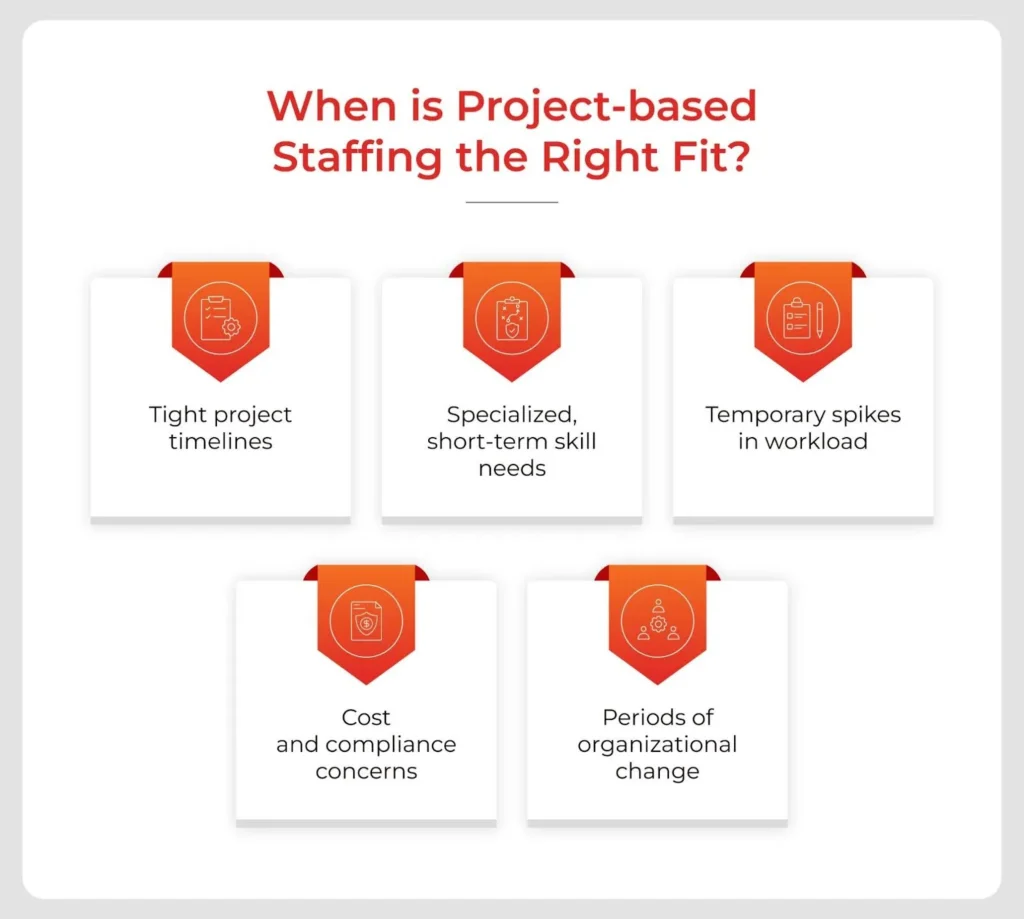Companies should opt for project-based staffing services when they need to hire specialized professionals for a fixed period, tied to a specific goal, outcome, or deliverable.
This is because not every role needs a long-term hire. Sometimes you’re racing against the clock; sometimes the skillset is ultra-specific; and sometimes the role disappears the moment a project wraps. In these cases, traditional hiring models can feel like trying to fit a square peg in a round hole.
That’s where project-based staffing services step in. They’re built for speed, flexibility, and precision.
It’s not about replacing full-time roles; it’s about aligning your hiring strategy with the reality of your business needs. In this article, we’ll break down when it makes the most sense to go project-based and how to make it work for you.
What Are Project-Based Staffing Services?
Think of them as precision hiring.
Project-based staffing services connect you with skilled professionals quickly and for a clearly defined duration. These experts are brought in specifically to execute particular deliverables, such as a system migration, regulatory rollout, or marketing campaign.
It’s not the same as temp work, which often corresponds to unplanned resource gaps. While flexible staffing solutions help manage seasonal peaks or short-term absenteeism, project-based staffing is built differently. It’s a proactive model designed to align talent directly with deliverables. Instead of filling seats, the focus is on completing a clearly defined initiative within a set timeframe.
When used effectively, project solutions can function as a seamless part of your strategic staffing plan, extending your internal team without impacting long-term headcount.
When Should Companies Use Project-Based Staffing Services?

There are numerous benefits of project-based staffing. It adds efficiency, becoming essential in certain business scenarios. Here are some scenarios where project staffing services are invaluable:
1. When timelines are tight, and delivery can’t wait
Sometimes, the project has already been greenlit. The budget’s approved. The timeline is aggressive. But your current team is stretched, and traditional hiring just won’t move fast enough.
Enter project staffing solutions!
Rather than waiting 6–8 weeks for a full-time hire to onboard, you tap into a curated database of professionals, often with prior experience in the exact type of project you’re running.
The ramp-up time is shorter. The learning curve is minimal. And they can start executing from day one.
This is especially useful in:
- ERP implementations or tech migrations
- Digital transformation rollouts
- Launch timelines that can’t afford recruitment delays
2. When the skill set is too niche to justify a full-time role
You don’t need a blockchain engineer forever. Or a UI auditor. Or a regulatory compliance lead for markets you’re exiting next quarter. But you do need them right now.
In these cases, hiring for a permanent role can over-inflate costs and underdeliver ROI. But waiting to hire also slows down delivery.
Project-based staffing services give you access to this niche talent without the long-term commitment. And because they’re scoped to the project, the onboarding curve is shorter and accountability is clearer.
3. When there is a temporary spike in workload
Not every workforce fluctuation stems from strategy. Sometimes, it’s driven by the natural rhythm of the business. Think event-based surges, regulatory cycles, or operational surges in sectors like retail, logistics, and healthcare. Some of our clients in the IT sector, for example, often turn to us for project-based staffing solutions to meet urgent or seasonal demands like scaling up quickly for product launches, software rollouts, or compliance deadlines.
These aren’t constant challenges, but when left unaddressed, they can snowball into year-end backlogs, compliance risks, or customer service bottlenecks.
Flexible staffing solutions help organizations buffer against these cycles. But when the workload surge is tied to a fixed deliverable (not just headcount), project solutions give you better control over timelines and expectations.
4. When cost control and risk mitigation matter
Managing costs goes beyond reducing payroll. It also involves avoiding the hidden risks that come with long-term commitments. We’re talking payroll liabilities, severance complexities, and the risk of misclassification — all of which can introduce avoidable financial and compliance headaches.
Project-based staffing cuts through that. You define the work, set the timeline, and structure the compensation accordingly. It’s a clean, legally sound arrangement that minimizes exposure while keeping momentum on your side.
For companies testing new markets, piloting products, or simply needing extra horsepower for a defined stretch, this model helps stay lean, flexible, and in control.
5. When the organization is in transition
Organizational change comes in many forms(mergers, digital overhauls, rapid scaling) and often puts pressure on internal teams to deliver without a clear roadmap.
According to the 2025 Deloitte Human Capital Trends Report, leaders today face a growing tension between navigating uncertainty and making bold, human-centric decisions that drive long-term outcomes.
Project-based staffing solutions act as a stabilizing force during these transitions, allowing organizations to stay agile without compromising execution.
Project-based staffing solutions help build successful teams and bring stability to the business during such times.
Building a team by bringing in external support for clearly defined deliverables helps you maintain continuity without overwhelming your teams.
Will it eliminate complexity? No, but it will keep critical projects on track, even when your internal structure is in flux.
The Bottom Line: Is Project-Based Staffing the Right Fit for You?
Well, not every project needs this model. But when you’re facing the following, it’s time to look beyond full-time recruits:
- The project has a non-negotiable deadline.
- The skill set is highly specialized and not a core part of your business.
- You need outcome-based accountability, not just role-based support.
- You want flexibility in scope, cost, and structure.
If three or more of those are relatable to you, project-based staffing likely makes operational and financial sense to your business.
Need specialized talent for a time-bound project without the long-term commitment? Discover project-based staffing services designed for impact with SPECTRAFORCE.
FAQs
The companies that benefit most from project-based staffing services are ones that need to stay agile and execute quickly. These companies often operate in fast-paced environments where deliverables are time-bound and outcomes matter more than titles.
Companies that typically benefit include:
1. High-growth startups that need to scale without inflating permanent headcount
2. Mid-sized organizations undergoing digital transformation or process overhauls
3. Enterprise teams launching new business lines, entering new markets, or managing complex change initiatives
The model works best when the need is:
1. Highly specialized
2. Clearly scoped
3. Tied to short- or medium-term outcomes rather than ongoing roles
Yes, project staffing is suitable for startups and small businesses. With limited headcount and tight budgets, hiring full-time for every function isn’t always practical. Project staffing solutions allow founders to bring in top-tier talent for specific needs, like a new product launch or compliance rollout, without the long-term financial commitment of permanent hires.
Project-based staffing reduces exposure to several common risks associated with traditional hiring, such as payroll liabilities, severance costs, misclassification issues, and underutilization of permanent staff. Because the scope, timeline, and compensation are all defined upfront, engagements remain tightly controlled, both legally and financially.
Project-based staffing is vastly different from temp staffing or flexible staffing solutions. Temp staffing often fills urgent, short-term vacancies, while flexible staffing solutions are great for seasonal cycles or backfilling roles. Project-based staffing, however, is more strategic. It’s used when a business wants to execute a specific initiative that requires defined expertise and clear deliverables, like migrating systems, launching a product, or rolling out policy changes.
In most cases, project staffing can be deployed significantly faster than traditional hiring, often within days to a couple of weeks. That’s because you’re tapping into an existing talent pool that’s already been vetted and matched to your scope.



